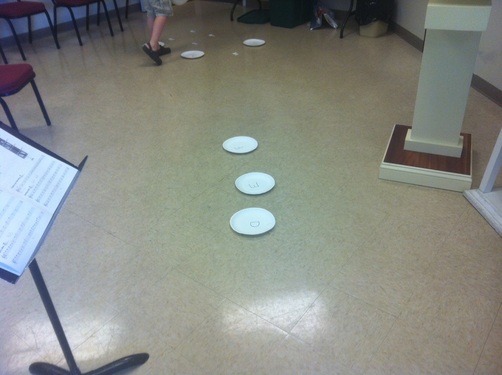Piano teachers are great. There are websites, blogs, books, and conferences all dedicated to how to be a better piano teacher, how to incorporate new ideas, how to make old things fun, and how to work games into the curriculum. While the drum education world has made a few strides in this direction I have yet to find any guitar educators that are doing anything like what was previously mentioned.
In all my years of teaching, I have never incorporated games. I have always believed that learning to play an instrument well should be reward in itself. While I still think this is true for older students (teenagers and older), younger students can definitely benefit from some extra motivation. Beginner lessons for students under 10 can be pretty boring for the student and the teacher while working on a lot of the foundational material. With this in mind, I have started incorporating games into my guitar lessons, and will work them into piano lessons in the fall.
There are endless resources for piano games and activities, so I won't go into detail here but my favorite websites thus far are: Susan Paradis' website, Discoveries Piano Studio, and probably my favorite so far, MusicMatters. Some have great resources and other times it's just really good to hear someone else sharing the same experiences that you are.
Here are two guitar games that I have begun using with my students. I need help naming them!
Game 1
- Benefit: Learning treble clef note names, note types and symbols
- Items Needed: Flash Cards with notes on treble clef and note types/symbols (quarter note, treble clef, etc)
- Setup: Mix up flash cards and spread them on a table on one side of the room.
- Game Play: Stand on the other side of the room (opposite the flash card table) with your student. Call out a note name or note symbol. They have to run to the table find it and bring it to you. If they get it right, give them a new note/symbol to find. If they get it wrong, they have to go back and try again. When they get to the last card they have to tell you the name of the note/symbol. I time this game so that it's a race. Students compete against each other and their previous times.
Game 2 (pictured above)
- Benefit: Learning notes on the fretboard
- Items Needed: Paper Plates, Paper, Marker, Tiled floor
- Setup: Write note names on paper plates. Write fret numbers on small sheets of paper. Use tiled floor (like a grid) as fretboard and place fret numbers accordingly. Scatter plates across the room.
- Student has to grab the paper plates and put them in the correct location on the 'fretboard'. Time them so that they can compete against each other and themselves.
So, what do you think? I have found that these games (though they seem simplistic) really help students to grasp the ideas, give us a few minutes out of our chairs (great exercise running around the room!), and have a fun new way to look at the instrument. I'll post more of these as I think of them and use them.
Now I need YOUR help! What do I name these games? Fellow teachers, what are games that you use? I've seen that a lot of games work for all instruments, or can be adapted to fit.
P.S. Stay tuned for an awesome iPad game that I have gotten the privilege to beta test. Coming soon!

 RSS Feed
RSS Feed